认知语言学在英语学习中的运用
论认知语言学在英语教学中的运用认知语言学的几大理论
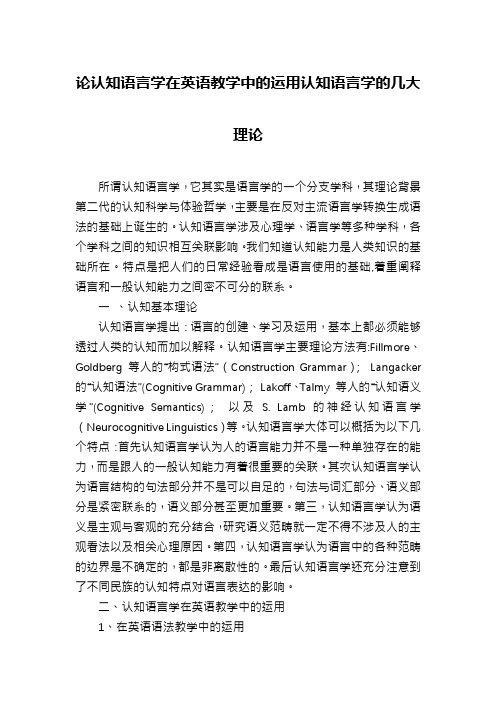
论认知语言学在英语教学中的运用认知语言学的几大理论所谓认知语言学,它其实是语言学的一个分支学科,其理论背景第二代的认知科学与体验哲学,主要是在反对主流语言学转换生成语法的基础上诞生的。
认知语言学涉及心理学、语言学等多种学科,各个学科之间的知识相互关联影响。
我们知道认知能力是人类知识的基础所在。
特点是把人们的日常经验看成是语言使用的基础,着重阐释语言和一般认知能力之间密不可分的联系。
一、认知基本理论认知语言学提出:语言的创建、学习及运用,基本上都必须能够透过人类的认知而加以解释。
认知语言学主要理论方法有:Fillmore、Goldberg 等人的“构式语法”(Construction Grammar);Langacker 的“认知语法”(Cognitive Grammar);Lakoff、Talmy 等人的“认知语义学”(Cognitive Semantics);以及S. Lamb 的神经认知语言学(Neurocognitive Linguistics)等。
认知语言学大体可以概括为以下几个特点:首先认知语言学认为人的语言能力并不是一种单独存在的能力,而是跟人的一般认知能力有着很重要的关联。
其次认知语言学认为语言结构的句法部分并不是可以自足的,句法与词汇部分、语义部分是紧密联系的,语义部分甚至更加重要。
第三,认知语言学认为语义是主观与客观的充分结合,研究语义范畴就一定不得不涉及人的主观看法以及相关心理原因。
第四,认知语言学认为语言中的各种范畴的边界是不确定的,都是非离散性的。
最后认知语言学还充分注意到了不同民族的认知特点对语言表达的影响。
二、认知语言学在英语教学中的运用1、在英语语法教学中的运用在传统的英语教学中,对学生的语法教学总是占据着主导地位。
一般而言,人们认为掌握语法是掌握语言的基础,而快捷的掌握语法的方法就是通过大量的英语课文阅读翻译。
这种教学法的主要忽视了学生的口语和听力训练,造成了学生口头交际能力较差;由于加大追求语法的准确性,从而某种程度上却忽略了学生的语言创造能力,使学生的语言学习的主观能动性不能充分展露出来,这很不利于良好的英语教学的进展。
如何在英语词汇教学中运用认知语言学理论

长 春 理 工大 学 学 报 ( 会 科 学版 ) 社
Jun l f hn cu nv rt f cec n eh ooy Sca Sine dt n) o ra o C ag hnU ies yo S i eadT cn lg ( oil cecs io i n E i
对 其 有 一 个 较 为 清 楚 的 认 识 , 它 的 上 义层 次 和下 义 层 次 的 和 词 汇 相 比 , 最 容 易 被 记 住 。而 上 义 层 次 “ 物 ” 它 植 和下 义 层 次
‘ 树” “ 松 、 橡树” 等则 由于太抽象或太 具体 而不 容易被人们感 知和记忆 , 有些甚至是只有植物学家才会触及 的概念 。通过 上面的例 子我们还发现 , 尽管下义层次上的植物种类繁多 , 但 在汉语 中都离不开 “ 这一基本层次 , 树” 而在英语 中却采用了 大量新的具体的词汇来表示 , 给英语学 习者带来莫大 的记 这 忆 负 担 。因此 , 张 教 师 从 基 本 层 次 的词 汇 抓 起 , 基 本 词 汇 主 在
生在 遇到新词时 , 在头脑 中再现这个词的家族成员 , 然后 自觉 地将 它放 入 一 个合 适 的 层 级 , 样 便 可 以较 容 易 地 记 住 所 有 这 与之相关 的词 汇。也可以说 , 师要鼓励学生运用认知语言 教 学中概念 的层级分类图来记忆词汇 , 久而久之 , 学生就会形成 层级分类 的思维方式 , 从而快速 、 大量地认识和记忆英语词汇 。
大脑 中的语言…。 认知语言学是 2 世 纪 7 0 0年代末 8 0年代
初兴起的一门边缘 学科 , 它与很多学科 , 如认知科学 、 认知心 理学 、 哲学 、 逻辑学 、 社会 学 、 言学等密切 相关 , 语 内容极其 丰 富 。认知语言学的建立对外 语教学产生了重大的影 响 , 尤其
语言学理论在英语教学中的应用

语言学理论在英语教学中的应用导言:随着全球化的推动,英语作为一门国际语言的地位日益重要。
对于母语非英语的学习者来说,学好英语是他们实现全球交流的关键。
而在这个过程中,语言学理论的应用在英语教学中起到了至关重要的作用。
本文将探讨语言学理论在英语教学中的应用,并就其中的几个重要理论进行阐述。
第一部分:社会交互理论的应用社会交互理论是语言学中的一种重要理论,它强调了在交际过程中的互动和共同构建意义的作用。
在英语教学中,运用社会交互理论可以激发学生学习英语的兴趣和积极性。
在课堂活动中,教师可以引导学生进行交互对话,让学生们在真实的语境中进行语言运用,从而提高他们的语言表达能力。
此外,教师还可以组织小组讨论或角色扮演等活动,让学生们积极参与其中,通过交互和合作的过程来增进他们的语言技能。
第二部分:认知语言学理论的应用认知语言学理论关注的是语言产生和理解的认知过程。
在英语教学中,运用认知语言学理论可以帮助学生更好地理解和运用语言。
例如,教师可以通过教授语法知识来帮助学生理解句子的结构和语法规则。
同时,教师还可以运用认知语言学理论中的“语言输入-语言输出”原则,鼓励学生进行大量的语言输出练习,通过实践不断提升他们的口语表达能力。
第三部分:交际语用理论的应用交际语用理论研究的是语言在交际过程中的使用规则和策略。
在英语教学中,运用交际语用理论可以帮助学生理解英语中的语用差异和社交礼仪,从而提高他们的跨文化交际能力。
例如,教师可以引导学生学习英语中的礼貌用语和表达方式,让他们了解在不同场合下应该如何使用语言。
此外,教师还可以通过讨论真实生活中的交际问题和情景模拟等活动,让学生们在实践中学习交际技巧。
第四部分:认知语言学习理论的应用认知语言学习理论研究的是语言学习的认知过程和策略。
在英语教学中,运用认知语言学习理论可以帮助学生更高效地学习英语。
例如,教师可以教授学生一些学习策略,如记忆单词的技巧、阅读理解中的积极推测等,帮助他们提高学习效果。
认知语言学在英语翻译领域的现状与启示

认知语言学在英语翻译领域的现状与启示一、认知语言学在英语翻译中的应用现状1. 认知翻译理论认知翻译理论是认知语言学在翻译领域的主要应用之一,它认为翻译是一个认知过程,翻译者在翻译过程中会受到各种认知因素的影响。
在英语翻译中,认知翻译理论给了翻译研究者一个新的思路,可以通过翻译者的认知加工过程来解释翻译现象,提供了更为深入的理解和分析。
2. 语言认知及翻译难点在英语翻译过程中,语言认知在翻译难点中扮演着重要的角色。
词义翻译、句法结构、文化差异等问题,都需要依赖翻译者的语言认知能力来解决。
认知语言学提供了一种新的思维框架,通过对语言认知过程的深入研究,有助于更好地理解和解决这些翻译难点。
3. 翻译教学认知语言学在英语翻译教学中也有着广泛的应用。
通过认知语言学的理论和方法,可以更好地指导学生进行英语翻译学习,提高学生的翻译水平和能力。
认知语言学也提供了一种新的教学思路,可以促进翻译教学的改革和创新。
1. 强调认知翻译能力的培养在英语翻译领域,我们需要更加重视和培养翻译者的认知翻译能力。
只有具备良好的语言认知能力,翻译者才能更好地理解原文含义,并将其准确地表达出来。
我们需要通过各种途径,提高翻译者的认知水平,为他们提供更好的认知翻译支持。
结语认知语言学在英语翻译领域的应用具有重要的意义,它为我们提供了一种新的思维框架和理论视角,有助于更好地理解和解决翻译过程中的难题。
通过加强认知研究与实践的结合,培养翻译者的认知翻译能力,推动翻译教学改革,我们可以更好地发挥认知语言学在英语翻译领域的作用,不断提高翻译水平和能力,促进跨文化交流和理解。
【文章字数: 672】。
谈认知语言学在英语语法教学中的应用

谈认知语言学在英语语法教学中的应用
谈认知语言学在英语语法教学中的应用是近年来英语教学领域的一种新的探索,它的成功的探索为英语语法教学带来了新的想法和思考方向,鼓励我们用更加有效的方法来提升教学质量。
认知语言学在英语语法教学中得到了广泛的应用。
具体表现在:
一、使用直观和图形化的方式。
认知语言学倡导使用直观的方式解释语法,采用图形化的表示方式,如示意图和图表。
这种方式容易理解,方便掌握,有助于学生把握语法规律。
二、使用动态的教学方式。
认知语言学注重建立系统的语言理解,使用动态的教学方式,重视教师——学生之间的交流和对话,学习者可以更好地理解语言结构,从而更好地掌握和运用语法。
三、使用多媒体技术。
认知语言学强调通过各种媒体来加深学习者理解,如使用视频和录音
等多媒体技术,让学习者更轻松容易地接受语法知识。
这样,学习者可以听、看、感受,更有效地学习语法知识。
总的来说,认知语言学对英语语法教学有着重要的作用,可以有效提高学习者对语法的理解和运用能力。
认知语言学对英语教学的指导意义

认知语言学对英语教学的指导意义作者:于东来源:《科教导刊》2012年第17期摘要认知语言学兴起于上个世纪八十年代,它提出语言的创建、学习及运用,基本上都必须能够透过人类的认知加以解释。
认识来源于实践,认识又能指导实践,教师如果能够深入理解认知语言学所蕴含的哲学规律,掌握其阐明的各种理论,并把它们应用到英语教学当中,将对英语教学实践产生巨大推动。
关键词认知语言学英语教学教师中图分类号:H319 文献标识码:A认知语言学认为,语言不是直接表现或对应于现实世界,而是由一个中间的“认知构建”层次将语言和现实世界联系起来。
在这个认知中介层,人面对现实世界形成各种概念和概念结构。
人的语言能力并不是一种独立的能力,而跟人的一般认知能力紧密相关。
人的语言能力依附于人的一般认知能力,语言能力跟一般认知能力没有本质上的差别,语言能力的发展跟一般认知能力的发展有极为密切的关系。
因此,在英语教学过程中,教师应调动学生充分的了解和利用已有的对事物的认知能力,去感知和学习语言,以取得良好的教学效果。
本文将从以下三个方面说明认知语言学对英语教学的指导意义:1 认知语言学与词汇教学在英语的学习中,最重要的就是词汇的掌握,巧妇难为无米之炊,学习语言没有一定的词汇量同做饭无米的道理不尽相同。
学习者只有掌握了大量的词汇,并能深刻理解、灵活应用,才能准确的进行表达。
但是英语的词汇和汉字一样数量庞大,每一个词又有很多含义,很多时候,学习者即使死记硬背记住了许多单词,却没有抓住重点,不能灵活运用,因此仍然无法准确的进行语言表达。
认知语言学的范畴理论能够帮助我们在教学中解决这一难题。
范畴是认知语言学的主要研究对象之一,根据人固有的认知能力,学生学习词汇应当从基本范畴向其他范畴过度,这样大大降低了记忆词汇的难度。
基本范畴的词汇是根据人们日常生活中所使用的高频词来划分的,由于和学习者固有的认知内容相关,所以容易记忆,而且这些词汇在对话中出现频率较高,掌握了它们就等于是打开了用英语交际的大门。
认知语义学理论在大学英语词汇教学中的启示和应用

术.
由此 , 以看 出 它 的 相 似 性 词 汇 可 以有 tr 和 可 u n moe v 。再 往 相 同意思 词 汇上 联想 , 会 有 si ,pn 还 wr si, l ti ,hr, vle等 。这 时 教 师 可 以 总 结 对 于 这 个 wr w i r o l le v 范 畴来 说 m v oe是 tr un的上位 词 , si ,pn ti , 而 wr si, r l wl w i , tervl hr r a , ov l o t e e等是 下 位词 。
谈认知语言学在英语语法教学中的应用
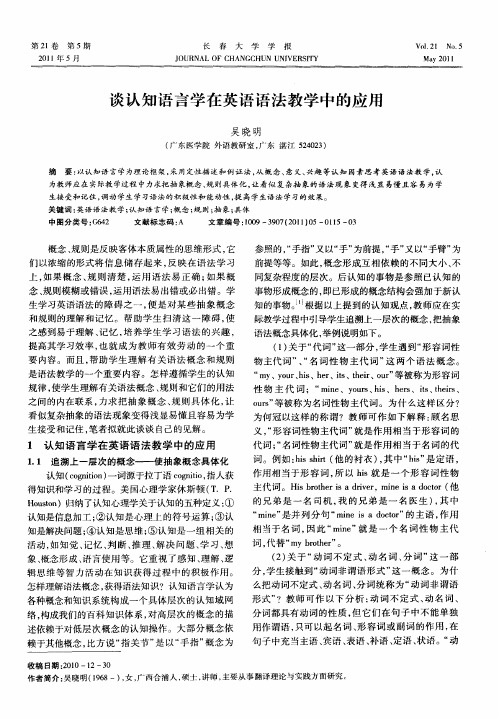
第 5期
长
春
大
学
学
报
Vo. No 5 1 2l . Ma 01 v2 1
2 1 年 5月 01
J RNAL OF CHAN OU GCHUN U VE r Y NI RS F
谈 认 知 语 言 学 在 英 语 语 法 教学 中 的 应 用
吴 晓明江 54 2 ) 2 0 3
前提等等 。如此 , 念形 成互 相依 赖 的不 同大 小 、 概 不
同复杂程度 的层 次。后认 知 的事物 是参 照 已认知 的 事物形成概念 的 , 即已形 成的概念结构 会强加 于新认
知的事物 。 根据 以上提 到 的认 知 观点 , 师 应在 实 … 教
念、 规则模糊 或错 误 , 用语 法易 出错或 必 出错 。学 运 生学 习英语 语法 的 障碍 之 一 , 便是 对 某 些 抽象 概 念
生接 受和记 住 , 笔者拟 就此谈谈 自己的见解 。
1 认知 语 言学 在 英 语 语 法 教 学 中的 应 用
1 1 追溯上 一层次 的概 念— — 使抽 象概念具 体化 .
认知 ( ont n 一词源于拉丁语 cg io 指人获 cg io ) i ont , i
词 。例 如 :isi ( 的衬衣 ) 其 中 “ 是定 语 , hs ha 他 , h
象、 概念形 成 、 言使 用 等。它 重视 了感 知 、 解 、 语 理 逻 辑 思维 等 智 力活 动在 知 识获 得 过 程 中的积 极 作用 。
怎样理解语法概 念 , 获得语法知识 ?认 知语 言学认 为
mn” ie 是并 列 分 句 “ n o t ” 主 语 , 用 miei ad c r 的 s o 作
认知语言学理论在大学英语词汇教学中的应用

中 最 好 , 典 型 的 成 员 , 其 它 成 员 具 有 不 同 最 而
程 度 的 典 型 性 ( ie e td ge so y iai , df r n e re f pc ly) 如 f l t 家 狗 就 比贵 妇 狗 更 属 于 “ ” 范 畴 。拉 博 夫 狗 的 (w .o o 17 1 8 的 实 验 证 明 了 在 人 的 认 1 h v,9 3,9 ) 7
孙 娟
( 东大学 外国语学院 , 东 济南 山 山 200 ) 5 10
[ 摘
要 】 知 语 言 学 理 论 对 英 语 词 汇 教 学 有 很 大 的指 导 作 用 , 知 语 言 学 所 关 注 的 基 本 范 畴 词 汇 , 型 理 论 , 象 图 认 认 原 意
式 , 念 隐 喻 , 言 的 象 似 性 等 方 面 对 当 前 大 学 英 语 词 汇 教 学具 有 重 要 作 用 。 概 语
常 用 的 功 能 词 、 词 、 般 名 词 、 图 像 效 果 动 一 有 的 实 物 名 词 、 质 形 容 词 和 常 见 的 意 义 相 反 品
的 词 语 。这 些 基 本 词 汇 与 f 们 所 说 的 基 本 范 E - 畴 词 汇 在 很 大 程 度 上 是 对 应 的 , 于 我 们 平 对
[ 键 词 ] 知 语 言 学 ; 语 词 汇 ; 似性 关 认 英 象 [ 中图 分 类 号 ] 392 H 1 、 [ 文献 标 识 码 ] A [ 章 编 号 ]04—77 (06 0 文 世 纪 8 年 代 兴 起 于 美 国 和 欧 洲 的 认 0
知 中 原 型 的 存 在 。 tb v 受 事 者 辨 认 一 组 ao 让 大 小 、 矮 不 同 的 杯 - 并 允 许 选 择 不 同 的 名 高 T -,
探讨认知语言学的理论对英语教学的启发
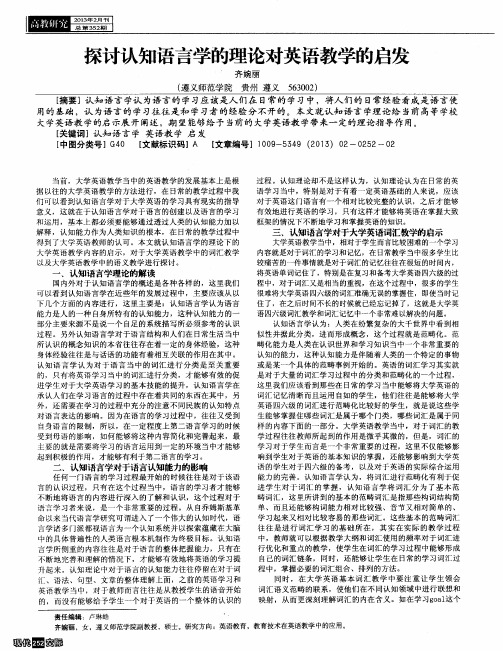
探讨认知语言学的理论对英语教学的启发
齐 婉 丽
( 遵义师范学 院 贵州 遵义
5 6 3 0 0 2 )
[ 摘要】认知 语 言学认 为语言 的学习应该是人 们在 日常的 学习中,将人们 的 日常经验看成是语言使 用的基础 ,认 为语 言的 学习往往是和 学习者 的经验 分不开 的。本文就认知 语言 学理 论给 当前 高等 学校 大学英语教 学的启示展开阐述 ,期 望能够给 予 当前 的大学英语教 学带来一 定的理论指导作 用。
一
过程 。认知理论却不是这样认为 ,认知理论认 为在 日常 的英 语学习当 中,特别是对于有着一定英语基础 的人来 说,应 该 对于英语这 门语言有一个相对 比较完整 的认识 ,之 后才 能够 有 效 地 进 行 英 语 的学 习 ,只 有 这 样 才 能够 将 英 语 在 掌握 大 致 框架的情 况下 不断地学 习和掌握英语的知识。
【 关键词 】认 知 语 言 学 英语 教 学 启 发
Байду номын сангаас
[ 中图分类号 】G 4 0 [ 文献标识码 】A [ 文章编号 】1 0 0 9 -5 3 4 9( 2 0 1 3 )0 2 —0 2 5 2 —0 2
当前,大学英语教学 当中的英语教 学的发展基本上是根 据 以往 的大 学英语教学的方法进行 ,在 日常的教学过程 中我 们可 以看 到认知语言学对于大学英语 的学习具有现实 的指导 意义 ,这就 在于认知语言学对于语 言的创建 以及语言 的学 习 和运用 ,基 本上都必须要 能够通过透过 人类 的认知能力加 以 解释 ,认知能力作为人类知识 的根 本,在 日常的教学过程 中 得 到了大学英语教师 的认可 。本文 就认知语言学 的理论下 的 大 学 英 语 教 学 内容 的 启 示 ,对 于大 学 英 语 教 学 中 的词 汇 教 学 以及大 学英语教学 中的语义教学进行探讨 。
认知语言学理论在英语教学范式改革中的运用
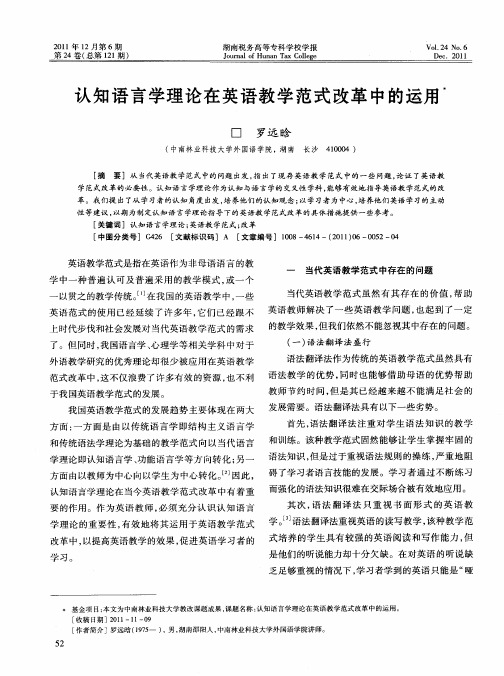
认 知语 言学 注 重 学 习 者 自身 的经 验 , 为语 言 认
种常见的传统英语 教学范式。3 P课堂教学模 式把 因为学 习者 的 自我 体验 而变 得 有 意义 。语 言 知识 来
英 语 课 堂教学 分 为 psnai ,rcc n rdci 源 于 学 习者 对 语 言 的使 用 , rettn pat eadpoutn o i o 如果 不 经 过 亲 身 的实 践
于我 国英 语 教学 范式 的发 展 。 教 师节 约 时 间 , 是 其 已经 越 来 越 不 能满 足社 会 的 但 我 国英语教学范式的发展趋势主要体现在两大 发展 需要 。语 法 翻译 法具有 以下一些 劣 势 。
方面 : 一方面是 由以传统语 言学 即结构主义语 言学
首先 , 法 翻译 法 注 重对 学 生语 法 知 识 的教 学 语
口 罗 远 晗
( 南林 业科 技 大 学 外 国 语 学 院 ,湖 南 长 沙 中 4 00 ) 10 4
[ 摘
要 ]从 当代英语教 学范式中的问题 出发 , 出 了现存英 语教 学范 式 中的一 些 问题 , 指 论证 了英语教
学范式改革的必要性。认知语言 学理论作 为认知 与语 言学的交叉性学科 , 能够有效地指导英语教学 范式的改 革。我们提 出了从 学习者的认知 角度 出发 , 培养他们的认知观念 ; 以学 习者为 中心 , 养 ̄ 4 英语学 习的主动 培 ' 1 1
知 观 念
在传 统 的英语 教 学 范 式 中 , 师起 着 重 要 的作 教
在英语 学 习 中 , 习者 以往 的学 习经 历 在 很 大 用。在英语教学 范式 改革 中, 学 教师作为英语 教学的
程 度上 影 响 了他们认 知 思维 的形 成 。教 师如 果 了解 引导 者 , 应在 全面 了解 学 习者 的基 础 上 , 真 地 把 握 认 了学 习者 的学 习 经 历 , 握 了他们 的认 知 思 维 和 观 对 学 习者 进行 引导 的“ ” 把 度 。 念 , 能够 有 效 地 促 进 学 习 者英 语 认 知 观 念 的形 成 就 和发 展 , 而 帮助他 们有 效地 进行 英语 学 习 。 从 首先 , 同 的学 习者 的知识 背 景 、 知结 构 都 不 不 认
英语词汇教学中认知语言学理论的应用 -完整获奖版

英语词汇教学中认知语言学理论的应用摘要:为更好地提高英语词汇教学的质量,教师不仅需要有高超的教学能力,而且也需要借鉴有关的英语语言的理论基础。
认知语言学理论对于英语词汇教学和学习具有重要的指导作用。
本文分析当前英语词汇教学中存在的问题,结合认知语言学的相关理论,探讨它对英语词汇教学和学习的启示。
关键词:认知语言学;英语词汇教学;教学启示词汇教学是英语教学体系的重要组成部分,是系统掌握英语知识的基本环节,有效的词汇教学不仅有利于学生系统掌握英语知识,而且有利于形成学生英语的综合运用能力。
经过一线英语教师和专家的共同努力,我国的英语词汇教学研究取得了显着的成绩,然而,不可否认我国英语词汇教研仍存在许多问题。
认知语言学属于认知学科及语言学的分支,主要研究人类认知水平与隐喻词汇习得之间的特殊关系。
本文在分析当前英语词汇教学中存在问题的基础上,结合认知语言学的相关理论,探讨它对英语词汇教学的启示。
一、英语词汇教学中存在的问题词汇知识是英语知识体系的最基础内容,词汇教学是英语教学的关键环节,因此教师根据学生英语词汇认知的实际情况并结合教材的实际内容开展教学,对于改善学生今后的英语学习、最终构建完整的英语知识体系意义重大。
多年来,我国一直高度重视英语教研活动,关于英语教学、尤其是英语词汇教学的研究成果颇丰,但也不可否认,目前我国的英语词汇教学依然存在诸多问题,主要表现在以下几个方面。
第一,在传统的英语词汇教学模式中,教师往往仅强调词汇灌输的数量,而且是单向的灌输,忽视了对学生认知思维能力的培养,影响了英语词汇教学的效率。
第二,英语词汇教学过于模式化和教条化,而理论研究又仅仅囿于西方已有成果,甚至简单套用其理论于我国的英语词汇教学,忽视我国英语词汇教学的实际,有关外语学习环境下的词汇教学略显苍白。
第三,英语词汇教学过程中,教师往往忽视对词汇习得策略的讲解和对学生学习能力的培养,造成学生在学习、应用较复杂的英语词汇时感觉困难重重,从而影响学生综合英语能力的提升。
认知语义学在大学英语词汇教学中的应用
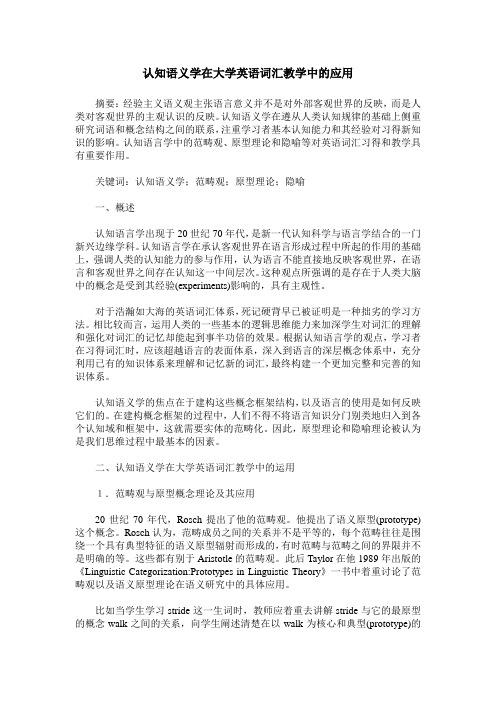
认知语义学在大学英语词汇教学中的应用摘要:经验主义语义观主张语言意义并不是对外部客观世界的反映,而是人类对客观世界的主观认识的反映。
认知语义学在遵从人类认知规律的基础上侧重研究词语和概念结构之间的联系,注重学习者基本认知能力和其经验对习得新知识的影响。
认知语言学中的范畴观、原型理论和隐喻等对英语词汇习得和教学具有重要作用。
关键词:认知语义学;范畴观;原型理论;隐喻一、概述认知语言学出现于20世纪70年代,是新一代认知科学与语言学结合的一门新兴边缘学科。
认知语言学在承认客观世界在语言形成过程中所起的作用的基础上,强调人类的认知能力的参与作用,认为语言不能直接地反映客观世界,在语言和客观世界之间存在认知这一中间层次。
这种观点所强调的是存在于人类大脑中的概念是受到其经验(experiments)影响的,具有主观性。
对于浩瀚如大海的英语词汇体系,死记硬背早已被证明是一种拙劣的学习方法。
相比较而言,运用人类的一些基本的逻辑思维能力来加深学生对词汇的理解和强化对词汇的记忆却能起到事半功倍的效果。
根据认知语言学的观点,学习者在习得词汇时,应该超越语言的表面体系,深入到语言的深层概念体系中,充分利用已有的知识体系来理解和记忆新的词汇,最终构建一个更加完整和完善的知识体系。
认知语义学的焦点在于建构这些概念框架结构,以及语言的使用是如何反映它们的。
在建构概念框架的过程中,人们不得不将语言知识分门别类地归入到各个认知域和框架中,这就需要实体的范畴化。
因此,原型理论和隐喻理论被认为是我们思维过程中最基本的因素。
二、认知语义学在大学英语词汇教学中的运用1.范畴观与原型概念理论及其应用20世纪70年代,Rosch提出了他的范畴观。
他提出了语义原型(prototype)这个概念。
Rosch认为,范畴成员之间的关系并不是平等的,每个范畴往往是围绕一个具有典型特征的语义原型辐射而形成的,有时范畴与范畴之间的界限并不是明确的等。
这些都有别于Aristotle的范畴观。
认知语言学理论在英语话题作文写作及教学中的应用

认知语言学理论在英语话题作文写作及教学中的应用摘要:当前英语话题作文写作及教学中存在部分学生“不知道写什么和不会写英文”的问题,存在教师“只教学生背单词、背模板”的教学误区。
近年来学界虽然对英语作文的“话题”很重视,但对学生主体关于写作话题的思路历程考察较少。
本文以认知语言学理论为基础,以学生为认知主体,建立基于写作话题的认知参照点模型和英语作文图式模型,并结合具体英语话题作文题目分析学生写作过程和教师引导策略。
认知模型的建立可以直观反映学生写作的具体步骤及思维路径,有助于指导学生分步骤完成写作任务,并且也为教师开展写作课堂提供指导。
本文为英语写作和写作教学提供了新的思路,对提高学生写作能力有一定的帮助。
关键词:英语话题作文;认知参照点;图式;英语写作教学1.引言英语话题作文在小学、初中、高中及大学生英语考试中都是重要的考察方面。
作文水平反映了学生运用英语句子表达思想的能力。
不同于阅读理解和听力考察学生对输入的英语的理解能力,作文考察的是学生输出英语的能力。
学生写出的作文是学生对已有关于写作话题的知识的重新建构的结果。
所以学生作为写作的认知主体,在写作中起着核心作用。
在写作教学中,教师则是引导者和学生重新建构知识的帮助者。
以往与写作教学相关的研究较少提及学生是如何重构知识写成作文的。
本文将在认知语言学的视角下,以学生为认知主体,通过建立基于写作话题的认知参照点模型和作文图式模型,将学生写作中重构知识的思维过程可视化。
认知模型的建立可以更好地帮助学生理解写作的具体过程,从而克服恐惧,在一步步构思中完成写作。
此外,该模型的建立有助于教师更好地开展写作教学。
教师清楚学生写作过程中的思维特点和知识需求才能更好地引导学生。
1.研究现状1.英语话题作文写作和教学现状首先关于研究对象的界定:本文研究的是“英语话题作文”的写作与写作教学。
之所以突出“话题”二字,是因为无论汉语作文还是英语作文都需要树立核心话题或论点,整个文章都基于此展开。
浅谈认知语言学在大学英语词汇教学中的运用

供 了全新的视角。从认知语言学的角度 出发 , 分析 大学英语词 汇教 学的现状及其存在 的问题 , 介 绍与词 汇教学 有关的认知语 言学方面的理论 , 提出 词 汇教 学的新思路 , 即结合单词 的深层意义和所在语境掷助学 生记忆单词,
能够达到事半功倍的效果。 关键词: 认 知学 词 汇 中图分 类号 : G 6 4 2 大学教 学 运用 文献标识码 : A 文章编号: 1 0 0 7 . 3 9 7 3 ( 2 0 1 3 ) 0 1 2 . 3 6 3 . 0 2
2 . 2 . 2基本范畴理论及在大学英语词汇教学中的作用
基本范畴理论为大学英语词汇教 学提供 了非常好的理论 认知语 言学 的领域 , 认为隐喻不止是一种语 言现象 , 还是人们 基础 。英语 的核心词汇 ( 或高频词汇) 是任何使用英语的场合 认识客观世 界的一个重要认知工具。人们基于“ 相似性” 的认 必备的基础词汇 。掌握 了核心词汇就意味着打 开了通 向基本 知基础将对 来源域 的经验映射到 目的域上 ,以此来认识 目的
l 引 言
重新审视词汇教学和习得的方法 ,找出更加有效的词汇教学
英 国语言学家威尔金斯 ( Wi l l 【 i n s )曾言 , “ 没有语法 , 表达 途径 。
甚微 ; 没 有词汇 , 表达 为零” 。对于任何 外语 的学习来说 , 词汇 2 . 1 认知语 言学 习得的重要性是毋庸置疑 的。然而对于大多数学生而言 ,词 认知语言学诞生于上世纪 8 0年代初 ,8 0年代末趋于成
因此其效果可想而知仍然不理想。所以我们需要寻求一种 更 2 . 2 . 1 基本范畴理论
加 有效的词汇教学方法来突破 现在 词汇 教学的僵 局,帮助 学
认知语言 学认 为人们在对周 围事物的认知过程中,把世
从认知语言学中得到的对英语词汇教学的启示

袁 娜
( 中国 海 洋 大学 外 罔语 学 院 , J 青 岛 L东 【 2 6 7 ; 台 大 学 外 国语 学 院 , 东 炯 台 6 0 1烟 山 240 ) 6 0 5
一
摘 要 :认 知 语 言 学 的 发 展 对 英 语 教 学 产 生 了重 大的 影 响 , 予 英语 教 学 许 多新 的理 论 支持 与 启 示 。 文从 认 知 语 言 给 本 学 所 涉及 的 基本 概 念 和 特 征探 讨 了认 知 语 言 学对 大学 英 语 词 汇教 学的 指 导作 用。 关 键 词 : 知 语 言 学 英语 词 汇教 学 启 示 认
扎 实 . 而 进 一 步扩 大 词 汇 量 。 从 首 先 , 本词 汇 多 是 词 形 简 单 、 节 较 少 的 不 可 分 析 的 基 音 本 族语 词 。 组 成 有 更 大 的任 意 性 。 因 此 , 本 范畴 次 属 中 性 其 基 词 , 用 频 率也 高 。 使 此外 , 基本 范 畴 词 的构 词 能 力最 强 。 本 范 基 生 的一 些 错 误 观 点 .使 学生 更 加 有 效 地 学 习并 且 积 极 参 加 到 课堂 测 试 当中 。
狭 义认 知 语 言 学 是一 门坚 持 体 验 哲 学 观 ,以身 体 体 验 和 认 知 为 出发 点 . 以概 念 结 构 和 意 义研 究 为 巾心 . 力 寻求 语 言 着 事 实 背后 的 认 知 方式 .并 通 过 认 知 方 式 和 知识 结 构 等 对 语 言 作 出统 一 解 释 的 、 兴 的 、 领 域 的 学 科 。 它是 语 言 研 究 的 一 新 跨 个 新 的发 展 趋 势 。 以语 义 为 中心 , 它 探索 意 义在 大 脑 中是 怎 样 建 构 的 . 究 原 型理 论 、 研 范畴 化 、 念 形 成 的过 程 及 机 制 。认 知 概 语 言学 的 建立 对 外 语 教 学 产 生 了 重 大影 响 .尤 其 对 词汇 教学 提 供 了有力 的理 论 支持 。 范 畴 与 词汇 教 学
- 1、下载文档前请自行甄别文档内容的完整性,平台不提供额外的编辑、内容补充、找答案等附加服务。
- 2、"仅部分预览"的文档,不可在线预览部分如存在完整性等问题,可反馈申请退款(可完整预览的文档不适用该条件!)。
- 3、如文档侵犯您的权益,请联系客服反馈,我们会尽快为您处理(人工客服工作时间:9:00-18:30)。
Application of Cognitive Linguistics in EnglishLearningBy 潘晓雅Class: English怀o82Student Number: 08402507School of Foreign LanguagesChangzhou UniversityJune 2011Abstract:This paper discusses the application of cognitive linguistics in different aspects of English learning, for example, the prepositions in grammar, vocabulary, listening and reading. The concept of cognitive linguistics is introduced first. Then the article lays out fundamental analyses in these aspects. The application is mainly introduced for the second language learning. With the help of cognitive linguistics, English learners could break through the bottlenecks of English study and make a great improvement.Keywords: cognitive linguistics, prepositions, vocabulary, listening, reading1.IntroductionFor English learners, it is really difficult for them to understand the complicated grammars, to memorize lots of vocabularies, to improve their listening and reading ability especially when they have reached a certain level. They can hardly break through the bottlenecks if they keep on using the traditional or direct methods to study English. This is the common phenomenon we can usually observe among Chinese students. They need more useful and advanced tools to help them to break through the bottlenecks they have confronted with for a long time and keep improving to higher level. Cognitive linguistics is one of these powerful tools.Cognition is part of mental process, which is the way we perceive and acquire knowledge. Cognitive linguistics combines the cognitive psychology and linguistics. It views language as one kind of cognitive action. In conclusion, cognitive linguistics is an approach that is …based on our experience of the world and the way we perceive and conceptualize it‟(Ungerer and Schmid, 2001:36), to analyze the nature of the language and regard the language as an instrument for organizing, processing and conveying information. The advanced theory of cognitive linguistics has provided important insights which demonstrate that many things that taken as arbitrary is more systematic than formerly thought. The development of these advance theory offers great opportunities for second language learners.2.Basics of Cognitive LinguisticsThe theory of the cognitive linguistics includes three points. First, thinking is not out of real shape of entity. That means the structure of concepts of thinking comes from the experience of human body and the structure becomes meaningful because of the body experiences. Second, thoughts are imaginations. Those abstract concepts are resulted from metaphor, metonymy and mental imagery, which are all based on experiences. Third, thinking has the characteristics of gestalt.One of the most fundamental human experiences is viewing spatial scenes, which is the relations between objects. People usually need to communicate each other about objects around them. The implication is that every language should have a system for communicating spatial configurations between the objects. Gestalt psychologists had identified some unconscious mechanisms, which are the cognitive mechanisms that resulted from our direct experience. Thus, the cognitive mechanisms constrain and provide particular structure to human experience. Instead of perceiving objects and their relations, the perceptual system of human organizes our conceptualization of the spatial scenes that we encounter. Following these theories, cognitive linguists argue that language is a reflection of human cognitive structure. It means that language ability is one part of the cognitive ability. The language is not only related to but also based on the conceptual knowledge, body experience and the functions of words. For example, propositional representations are constantly operating in our perception, body movement and physical manipulation of objects (Johnson, 1987).Therefore, in the English learning, the theory and the research achievements of cognitive language could be used for reference. In this way, the learners can have an insight into the language learning process so as to gain a large improvement in general.3.Application of cognitive linguistics in English learning3.1Pedagogical grammar: English prepositionsPrepositions are long assumed to be one of the most difficult areas of acquisition for second language learners. The approach to the semantics of English prepositions was developed in Evans and Tyler (2004a, b, In prep.). The concepts encoded by prepositions are image-schematic in nature and thus have an embodied basis. English preposition encodes an abstract mental idealization of a spatial relation derived from more specific spatial scenes. The spatial relations are relevant for human function and interaction with the physical environment. Thus, prepositional meanings are extended from the spatial to abstract domains in ways that are regular and constrained. In tradition, the semantics of English prepositions are largely arbitrary and difficult to characterize (Chomsky 1995). In consequence, memorization was usually suggested as the best strategy in pedagogy. On the other hand, cognitive linguistics provides an alternative way. It suggests that the differences in expressing spatial relations in different languages are not in arbitrary ways and the distinct meanings associated with a particular preposition are related in systematic, principled ways. So there is a better way to understand the semantics of second language.One important cognitive principle is that the spatial scenes can be explained in many ways. Any spatial scene can be viewed or conceptualized from a number of vantage points. Each shift in vantage point corresponds to a shift in interpretation of the scene (Langacker, 1987). A particular view or interpretation of a spatial scene can be conventionalized by a particular language. For example, when the large cloth is located in relation to a table so that the cloth covers the top of the table, the scene could be explained by focusing on the contact between the cloth and the table. So in English, a sentence can be written: The table cloth is on the table. If the observer interprets the scene in the way that the cloth is hiding the table from his view, the scene might be coded as: The cloth is over the table. If the observer focuses more on the table, then the English coding should be: The table in under the cloth. Thus, the same scene could be described in many ways in accordance to the ways being viewed and interpreted, or to which aspects of the scene to privilege. This is also the main reason for cross-linguistic mismatches and misunderstandings. In other words, if we understand better the spatial relations or the scene which being picked out to describe, we can understand better the meaning of English prepositions. This is the same for other English grammars.Tyler and Evans (2001b, 2004) also argued that cognitive linguistics helps to form a semantic network and hence reduce the need for rote learning. Besides, graphic representation can be used by language teacher as a useful presentational tool which is less confusing and vague. The second language learners could visualize and interpret the scene with their own experiences.To conclude, cognitive linguistics approach provides a more accurate, systematic means and a more clear and learnable presentation to study the English grammar which seems arbitrary and difficult.3.2VocabularyV ocabulary is essential in the second language learning or EFL. As David Wilkins said…Without grammar very little can be conveyed, without vocabulary nothing can be conveyed (Wilkins, 1974)‟, the importance of vocabulary could be inferred. However, in reality, learners are always complaining that they forget the words soon after they have memorized. In the meanwhile, language teachers give greater priority to the grammatical structures rather than vocabulary because they think the learners should memorize the vocabulary themselves. Vocabulary should become a learning objective in its own right because it is the largest and most important task facing the language learner. Unlike the first language learners, who can match the words on to concepts and construct a network of associations, the second language learner is likely to match the word directly onto his mother tongue equivalent. Many errors are due to these direct matches.According to Zhao (2003), at least three principles based on cognitive language can be applied to the study of vocabulary. The first is categorization, which means the classification of things in a cognitive process. …Categories and categorizations exist everywhere, and are ways we perceive the world; otherwise we cannot know it in appropriate way‟ (Glass & Holyoak, 1986). In the basic category, the vocabulary has a distinctive characteristic that could distinguish them from other vocabularies. For example, cat is one kind of animals. Running cat, sleeping cat, cat in TV all belong to the category of cat. We spend less time to recognize the basic vocabularies as they are high frequency used. Thus, in the learning of English vocabulary more attention should be paid to the acquisition of basic vocabularies. By knowing the basic vocabularies, we can readily and quickly acquire the whole category.The second is prototype theory. For one category, it should have common attributes. Then one of the objects in the category could be chose to be the prototype. Other objects should have similar attributes as the prototype has. The prototype must have the largest number of attributes of that category and can be easily distinguished from other category. The prototype theory could be used in the understanding of polysemy of English words. A word could have several meanings, but one core meaning could be selected as the prototype of the others. Or the other meanings are the extension or radiation of the meaning of prototype. Apart from the core meanings, core words could also be selected similarly. Other words could be defined by the core words. In this way, language learners can save a lot of time in memorizing each meaning and each word listed in the dictionary. They are using their cognitive imagination to connect all the similar vocabularies.The third is metaphor. As Johnson and Lakoff (1980) note, the conceptual system that our thought and behavior rely on is metaphoric in nature. Actually, we make use of metaphors everyday and everywhere. Metaphor is not only a figure of speech, but also a way we perceive the objects. It is a powerful cognitive tool for our conceptualization of abstract vocabularies. Therefore, the English learners could benefit a lot if metaphor is frequently and wisely used in vocabulary study.3.3ListeningListening is not a simple process of decoding, but a comprehensive process of analyzing, combining, concluding and re-building. Cognitive psychologists deem it has two forms in the information processing. One in the top-down processing, the other is bottom-up processing. The top-down processing starts from the high level graphical representation and background knowledge and ends in abstract results. The bottom-up processing starts from the input information which activates the lower lever but concrete graphical representation and ends in theformation of high level but abstract graphical representation. However, there are limitations for both forms. The listeners would unconsciously search their background knowledge for help. This is because the spoken discourse would only provide learners the direction to extract the background knowledge and establish the intention (Rumelhart & Ortony, 1977; Howard, 1987). In other words, listening comprehension is the result of interaction between background knowledge and spoken discourse. Thus, the background knowledge plays a key role in listening. If the listener could not refer to his own background knowledge, he would be easily distracted and form a wrong memorization. For example, if a Chinese English learner hears the word Halloween, he could probably just miss the word and have no memorization about the word if he knows nothing about the festival.Therefore, in English learning, we should pay more attention to the cultural background to the foreign countries so as to have a better interpretation and memorization in listening. In addition, we need to know how to search and use the knowledge in our brain to help us to comprehend the discourse information.3.4ReadingReading comprehension in deed is a complicated psychological process. It is the process that the reader subjectively processes the input information. Cognitive linguists believe that the meaning of the context is in our experiences and the understanding of the world rather than in the language itself. According to the principles of cognitive linguistics, an ideal mode of reading should include three aspects, the ability of conceptualization, the mode of information processing and the schematic knowledge. Usually, a reading text contains events, actions, or concepts, especially when a text is more extended. In practice, there are two methods of cognitive linguistics could be applied to improve English reading.The first is schema theory. It assumes that the reading text do not contain any meaning itself. Instead, it is the reader that constructs the text meaning from their existing knowledge, the structure of which is called …schema‟ (Anderson & Pearson, 1984; Carrell, 1984). The reader can receive information from a text by reading and at the same time he would search for some concepts existed in his brain to accommodate the newly acquired information so as to understand it. In other words, it needs reader‟s ability to connect the input information and the existing knowledge for successful comprehension. Thus, if the reader is previously told to gain some basic knowledge and concepts relating to the topic that he is going to read, he will have a much better reading comprehension. This is very useful for the second language learners.The second is categorization theory. This is more or less the same as what has discussed in vocabulary study. What‟s more, the principle of categorization is extended both horizontally and vertically. In horizontal, the internal structure of categories displays prototypical members surrounded by other members of decreasing similarity. In vertical, categories occur at different levels of abstraction of generality (Rosh, 1978:30). The events, actions and concepts contained in the text are different types of category or semantic category, which are constructed by the reader and require retrieval of concepts in the reader‟s mind. In addition, the concepts activated by the category can recall the experiences of prior categorization judgments of the reader. Therefore, previous experiences are really important in the reading comprehension, especially for the second language learners.4.ConclusionThe theory of cognitive linguistics can be applied in the English learning in respect of grammar, vocabulary, listening, reading and even some more aspects. The second language learners could benefit a lot from the combination of the cognitive linguistics and the English learning. But the precondition is that the learner should understand the principles of cognitive linguistics and learn to how to apply the advanced principles in the language learning so as to improve the English ability.References[1]Tyler, Andrea and Vyvyan Evans. The semantics of English Prepositions: Spatial Scenes,Embodied Meaning and Cognition. Cambridge: Cambridge University Press, 2003.[2]Tyler, Andrea and Vyvyan Evans. “Applying Cognitive Linguistics to Pedagogical Grammer:The Case of Over.”Cognitive Linguistics, Second Language Acquisition, and Foreign Language Teaching (2004): 257-280.[3]Li, Hong., and Wang Yan. A Cognitive Analysis & Learning of English Vocabulary. Beijing:Science and Technology Press of China, 2005.[4]Zhao, Yanchun. A survey of Cognitive Linguistics (I). Journal of PLA University of ForeignLanguage 23 (2000): No.5.[5]Carrel, P.L.. Schema theory and ESL reading: classroom implication and applications. TheModern Language Journal 68 (1984): 332-343.[6]李冬梅. 近十年来国内英语听力理解研究述评[J]. 外语界,2002,2.[7]马腾. 元认知策略在听力教学中的运用[J]. 甘肃高师学报,2004 (5).。
